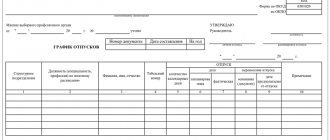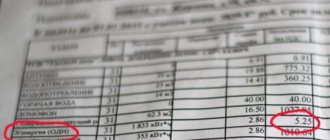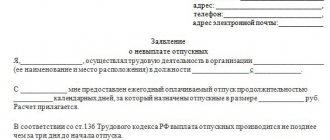The work of some employees is inextricably linked with business trips. Traveling to other cities, regions and countries is an integral part of an effective production process for them.
Business trips may be caused by the need for personal participation in business negotiations, exchange of experience, conclusion of transactions, etc.
As soon as the company's management decides to send one of its employees on a business trip, the company's accounting department is puzzled by a number of questions, in particular, how to properly register, calculate and conduct a business trip. In this article we will talk in detail about business trips, their procedure and calculation.
Should an employee be reimbursed for travel expenses during absences on a business trip ?
By the way, our special calculator will help you quickly calculate the amount of travel allowances.
What payment is guaranteed by law?
If an employee goes on a business trip, the employer, that is, the head of a budgetary institution, must provide such a specialist with compensation for his expenses.
Such expenses are associated not only with the purchase of tickets or renting a hotel room. Additionally, the payment for a business trip includes expenses that are aimed at compensating for the inconveniences associated with living outside the place of the main residence, that is, daily allowances. This is not a definitive list of guarantees. According to Article 168 of the Labor Code of the Russian Federation, the employer must guarantee the preservation of the workplace and payment according to the average earnings of the business trip.
Composition of travel expenses:
- Average salary for days spent on a business trip. Calculated based on the average for the 12 months preceding the month of business trip.
- Daily allowance. The organization must have a limit for payment. There are no legal restrictions; the size depends on the financial capabilities of the enterprise. The amount depends on the number of days of the business trip.
- Fare. Includes payment for tickets, commissions, insurance, and other types of expenses. For example, compensation for fuel and lubricants for an employee using a personal car on a business trip.
- Living expenses. It is acceptable to include payment for a hotel room, payment for a bed or room in a dormitory, or payment for renting an apartment on a daily basis.
- Other expenses agreed with the employer. For example, an employee uses personal transport for a work trip. The cost of maintaining the car while on the road can be paid by the employer.
IMPORTANT!
Not all trips and trips of specialists can be classified as business trips. The article “Which trips are considered a business trip” will help you understand the situation.
What must an employer pay a posted employee?
In accordance with labor legislation, the employer must compensate the employee (Article 168 of the Labor Code of the Russian Federation):
The employer sets the procedure and standards for reimbursing employees for travel expenses independently in a collective agreement or internal regulations.
How is a business trip paid in 2021?
All expenses of an employee on a business trip must be compensated. But legislators have made a number of recommendations to limit such expenses. What does it mean? A specialist may qualify for compensation, but not more than the established maximum amount of expenses. This rule applies mainly to daily allowances. But some government agencies have also limited spending on hotel accommodations.
The institution determines and regulates limits independently, based on its own financial capabilities. For example, for some federal civil servants the maximum daily allowance is 100 rubles per day, and the standard payment for a hotel room is 1000 rubles per day, while in commercial firms there are no restrictions at all.
In accordance with Art. 168 (Labor Code - business trips) payment (its amount) is not limited. This is solely the decision of the institution. Such limits must be approved by a separate order or local management order.
Travel expenses are paid in advance. Upon return, the specialist draws up an advance report and documents the costs. Attaches invoices, checks, tickets, contracts and receipts to the report. The accountant or responsible person checks the statements and then submits them to management for approval.
Read about the procedure for processing expenses in the separate material “How to process travel expenses in 2021.”
Withholding personal income tax and paying contributions from daily allowances
According to paragraph 4 of Art. 226 of the Tax Code of the Russian Federation, personal income tax must be calculated and withheld on the nearest date of payment of cash income to the employee. Before this, management must approve the advance report (according to the letter of the Ministry of Finance of Russia dated January 14, 2013 No. 03-04-06/4-5). This is due to the fact that the employee, even before the advance report, may underuse the funds allocated to him on a business trip: the employee is obliged to return the excess. The opposite situation: the employee exceeded the allocated amount (for example, due to delays in work matters or simply overspent).
Money that is allocated to a posted employee for reporting purposes is not considered an economic benefit until the employee returns from a business trip and the subsequent approval of the expense report. Before payment, the employee must provide documents about the time of the business trip and attach receipts explaining the expenses.
Contributions from excess amounts must be paid before the 15th day of the next month (Federal Law of July 3, 2021 No. 243-FZ).
Calculation of average earnings for travel allowances
To correctly calculate the amount of payment for the period of an employee’s business trip, follow the current Government Decree No. 922 of December 24, 2007. We present the basic rules in the form of instructions:
- We determine the billing period. For such payments, the calculation period is 12 calendar months preceding the month in which the employee is sent on a trip. For example, a business trip in April 2021, therefore, the billing period: February 2021 - March 2021.
- We calculate the basis for the calculation. We collect information about all accruals and income of the specialist. Then we exclude payments that are named in paragraph 5 of Resolution No. 92. For example, sick leave benefits, maternity leave and similar cases.
- We calculate the number of days actually worked. The indicator does not include days that fell during illness and vacation, as well as other periods that fell on excluded payments (Article 5 of Resolution No. 922).
- Now we divide the calculation base into the days actually worked. The resulting amount of average daily earnings is due to the specialist for each day he is on a business trip.
Calculation example
Travelers Eduard Antipovich was sent on business for 20 calendar days in April 2021.
Its calculated data for the period February 2021 – March 2021:
| Indicators | Periods, days | Charges, rubles |
| Total number of days | 254 | 900 000,00 |
| Sick leave | 41 | 150 000,00 |
| Annual leave | 28 | 90 000,00 |
| Total | 185 | 660 000,00 |
Average daily earnings: 660,000 / 185 = 3,567.57 rubles.
Payment for a business trip based on average earnings: 3567.57 × 20 days. = 71,351.40 rubles.
For information about which accounting entries to reflect these transactions in accounting, read the article “How to keep records of travel expenses in a budget organization.”
Overtime work on a business trip
The question of how overtime hours are paid on a business trip is not regulated at the legislative level. Overtime work is considered to be work outside the normal working hours. However, when employees are sent on business, records of the time they worked during the trip are not kept. Consequently, there are no standards for determining normal working hours on a business trip.
The issue also concerns forms of payment. After all, during the days of a business trip, an employee receives an average salary. This is a guaranteed type of compensation, but not a type of remuneration. Consequently, the provisions of Article 99 of the Labor Code of the Russian Federation are inapplicable in such a situation. But what should an employer do, since not one of his subordinates will agree to work for free, especially beyond the established standards.
Procedure:
- Set standards. The procedure and amount of overtime payment should be specified in the regulations on business trips. For example, establish that for the first two hours of overtime, payment is 1.5 times the average earnings. For the rest of the overtime work - 2 times the amount. But additional payments may be higher, depending on the financial capabilities of the company.
- Obtain the employee's consent. To do this, send a written notice to the employee with a proposal for overtime work. In your application, be sure to include information about the increased payment. There is no unified proposal form; prepare a document in any form.
- Place an order. Having received the written consent of the subordinate, it is necessary to issue an order to engage in overtime work during the business trip.
- Ensure time is tracked. This is necessary for payment in full. Use a unified form of working time sheet or develop and approve your own, which the employee will fill out to record overtime and overtime.
IMPORTANT!
If duties on a business trip occur at night, then similar actions must be taken. Set the amount of payment in the business trip regulations.
Please note that if travel time falls during the night hours, from 00:00 to 06:00, then no additional payments or surcharges are due. For example, if an employee returns on a night flight, there is no need to pay for night hours.
Business trips on weekends and holidays
How days on a business trip that fall on holidays and weekends are paid depends on whether the subordinate worked or not.
If an employee did not work on a weekend or holiday, then there is no need to pay for the days according to average earnings. For example, a specialist is sent on a business trip for 10 days, including 1 holiday and 2 days off. Calculate the average earnings only for the 7 working days of your stay on a business trip.
IMPORTANT!
You pay per diem for all days, regardless of whether the specialist worked or not. Include in the calculation working days, holidays, weekends, travel and downtime days, departure and return days.
If an employee worked on a weekend or holiday while on a business trip, then pay for this time in the following amount:
- at least one time from the tariff rate (official salary), if the employee requested additional rest time;
- no less than twice the tariff rate (official salary), if the employee decides to refuse time off.
IMPORTANT!
When calculating payment for work on weekends and holidays, take into account not only the official salary, but also compensation and incentive payments, allowances and additional payments provided for by the current remuneration system. For example, regional coefficients, additional payment for experience, bonus for qualifications.
A similar payment procedure applies if an employee goes on a business trip on a weekend or holiday. Or returns from it. For example, a specialist goes on a trip on May 1. This is a holiday. Therefore, the employer must offer double pay or time off and pay in a single amount.
Refund of compensation in case of trip cancellation and force majeure
Keep records in Kontur.Accounting - a convenient online service for calculating salaries, travel allowances, benefits and sending reports to the Federal Tax Service, Pension Fund and Social Insurance Fund. Get free access for 14 days
If a planned business trip is cancelled, the employee can receive money for unused tickets. You can also get a refund of the amount spent on obtaining a visa except for the fee paid.
It is worth considering that when returning tickets, the airline in most cases returns only part of their cost (especially on cheap fares). In this case, the difference in the amount paid and the amount returned is usually justified as a fine for violation of transportation rights.
If force majeure occurs during the business trip itself (bad weather, flood, plane breakdown, etc.) and the employee cannot return home on time, then the company must provide him with daily allowance and pay for the necessary accommodation. In this case, the employee must put a stamp/mark on the travel document (certificate) with the actual date of departure. If a travel document is not provided for by the organization’s accounting policy, then a document confirming the fact that the employee was delayed through no fault of his own can be a certificate from the airport about the cancellation or delay of the flight.
Calculation example
Morkovkin Stepan Igorevich was sent on a business trip for 15 days. - from April 17 to May 1 inclusive. He worked for 11 days. (10 on weekdays and 1 on weekends). Average earnings for the billing period are 2000 rubles. The tariff daily rate is 2500 rubles. For work on days off, double pay is due; Morkovkin did not take time off.
Standards for reimbursement of travel allowances by organization:
- daily allowance - 1000 rubles per day;
- travel: tickets - 5000 rubles one way;
- accommodation: hotel - 2000 rubles per day.
The accountant accrued the following travel payments:
- daily allowance: 1000 × 15 days. = 15,000 rubles.
IMPORTANT!
There is a limit for personal income tax on daily allowances. In Russia - 700 rubles per day and 2500 rubles. - abroad. Withhold personal income tax from the difference and charge insurance premiums.
- Personal income tax: 15,000 - (700 × 15 days) × 13% = 585 rubles;
- insurance premiums: 15,000 - (700 × 15 days) × 30.2% = 1359 rubles;
- transportation costs: 5000 × 2 = 10,000 rubles;
- living expenses: 2000 × 14 days. = 28,000 rubles;
- average earnings: 10 workers. days × 2000 rub. = 20,000 rub.;
- payment for work on holidays and weekends: 2500 × 2 size × 2 days. = 10,000 rub.
Why do we pay for two days at an increased rate? After all, the employee only worked on one day off? The fact is that Morkovkin was returning home on the May 1st holiday. He didn't take time off. Therefore, a specialist is entitled to payment of no less than double the tariff rate or official salary, taking into account incentives and compensation allowances.
Step-by-step instruction
Designer-designer P. A. Mikhailov was sent on a business trip from September 21 to 27. According to the work schedule, Saturday and Sunday are days off.
On September 30, the accountant calculated the wages of Mikhailov and all other employees for the month, including for 5 working days of the business trip.
Step-by-step instructions for creating an example. PDF
| date | Debit | Credit | Accounting amount | Amount NU | the name of the operation | Documents (reports) in 1C | |
| Dt | CT | ||||||
| Calculation of wages and insurance premiums | |||||||
| September 30th | 26 | 70 | 30 000 | 30 000 | 30 000 | Payroll | Payroll |
| 26 | 70 | 6 000 | 6 000 | 6 000 | Calculation of earnings during a business trip | ||
| 70 | 68.01 | 4 860 | 4 680 | Withholding personal income tax | |||
| 26 | 69.01 | 1 044 | 1 044 | Calculation of contributions to the Social Insurance Fund | |||
| 26 | 69.03.1 | 1 836 | 1 836 | Calculation of contributions to the FFOMS | |||
| 26 | 69.02.7 | 7 920 | 7 920 | Calculation of contributions to the Pension Fund | |||
| 26 | 69.11 | 72 | 72 | Calculation of contributions to NS and PP | |||








